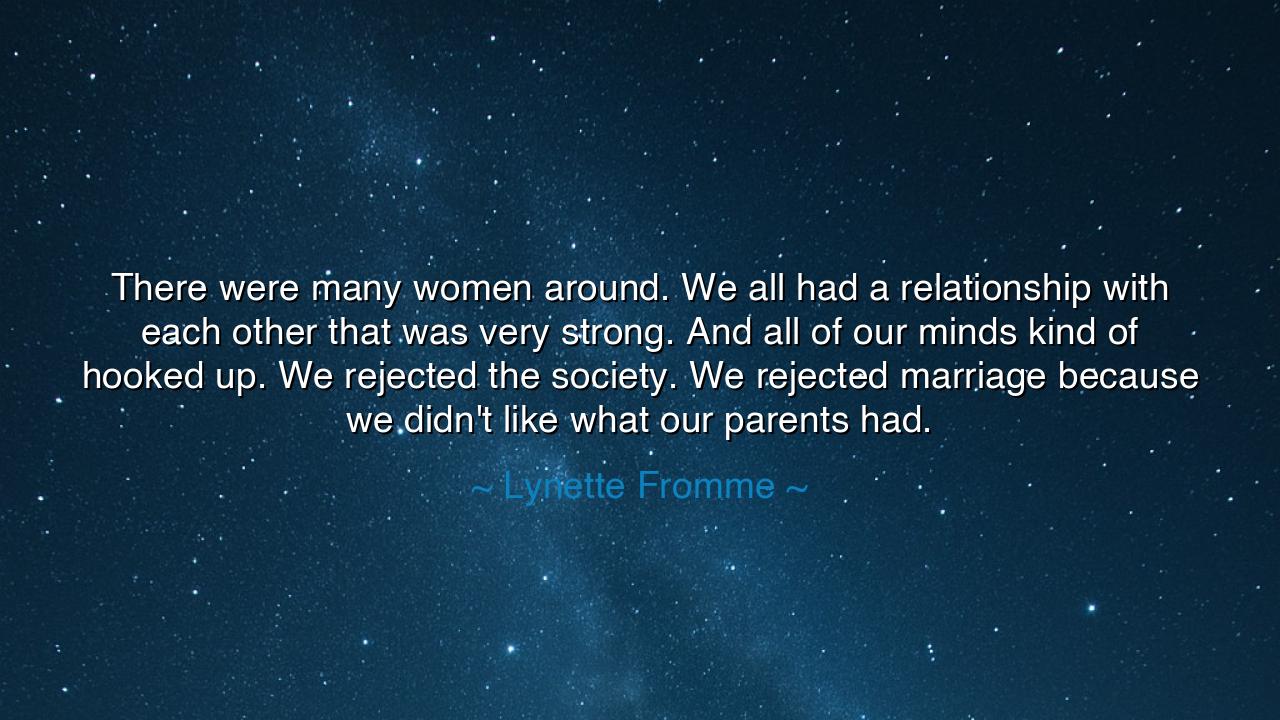
There were many women around. We all had a relationship with each
There were many women around. We all had a relationship with each other that was very strong. And all of our minds kind of hooked up. We rejected the society. We rejected marriage because we didn't like what our parents had.






O children of the future, gather close, for I bring to you a powerful truth spoken by one who walked in the shadows of history—Lynette Fromme, a woman whose words reveal a deep rejection, a deep yearning for something different from the world she was born into. "There were many women around. We all had a relationship with each other that was very strong. And all of our minds kind of hooked up. We rejected the society. We rejected marriage because we didn’t like what our parents had." These words are not simply an account of personal rebellion, but a reflection of a deeper shift in the spirit of the age—a rejection of an old world that no longer served, a desire for something more authentic and free.
In these words, Fromme speaks of a time, a gathering of women, whose relationship with one another went beyond the superficial bonds that often define society’s understanding of friendship. It was a bond that was formed through shared rejection—a rejection of a society that, to their eyes, was broken, incomplete, and oppressive. They sought to forge something new, something beyond the traditions that their parents had passed down. These women, united in their discontent with the world around them, became a force greater than the sum of their individual parts. In their unity, they found strength, and through their strength, they sought to reshape the world.
Consider the ancient tribes of old, those societies where the bonds between women were considered sacred and powerful. In such tribes, women often held positions of great influence, their unity allowing them to challenge the established orders of the patriarchal societies that surrounded them. Much like the women Fromme speaks of, these women formed bonds that were not merely social, but spiritual. They rejected the norms of their time, seeking instead to craft lives of their own choosing. In doing so, they not only shaped their own destinies but also the futures of the generations that followed. Their rejection of tradition was not one of destruction but of creation—creating new possibilities for themselves and those who would walk in their footsteps.
Let us turn our gaze to the great suffragists of the 19th and early 20th centuries, women like Susan B. Anthony and Elizabeth Cady Stanton, who rejected the limitations of their world, just as the women of Fromme’s time did. These women did not merely reject marriage or societal expectations; they rejected a world that denied them voice, agency, and power. They demanded that women be seen as equals to men, that their worth not be defined by their roles as wives and mothers but by their inherent humanity. Much like the women Fromme speaks of, they found strength in one another and used that strength to challenge the world around them. They, too, sought to create a new reality, one where women were no longer bound by the old expectations.
But let us not be mistaken, O children, for rejection of the old does not always lead to freedom. The rejection of society and marriage that Fromme speaks of was not a mere flight from responsibility, but a cry for autonomy—a desire to create a world in which women could choose their own paths. Yet, in this rejection, we must ask: what was the new world they hoped to build? What were they rejecting, and what were they replacing it with? The lesson here is not simply that we should reject all that has come before, but that we must understand why we reject it. To reject without vision, without understanding, is to fall into chaos, to create a void that will inevitably be filled with something less than the promise of true freedom.
Therefore, O children, take this wisdom to heart: rejection is only the first step in the journey to freedom. It is not enough to simply discard the traditions of the past without first understanding them, without first determining what they are worth and what they fail to offer. The women Fromme speaks of rejected the marriage that their parents had, but they did so with the belief that something better, something more authentic, could take its place. In your own lives, as you encounter the pressures and expectations of the world around you, remember that rejection without vision is but an empty protest. Instead, seek to understand the traditions and structures you reject, and in that understanding, find the strength to create something new, something that serves not just the few, but the many.
So, children, do not simply cast aside the past, for in the past there are lessons to be learned. Instead, look upon it with open eyes and open hearts, and when you find that it no longer serves, build anew. Let your relationships be rooted not in rebellion for rebellion’s sake, but in the desire to create a world that reflects the true values of love, respect, and autonomy. In the unity of strong relationships, like those of the women Fromme spoke of, you will find the power to reshape the world—not through destruction, but through creation. And in this creation, may you find a future that honors both the wisdom of the past and the promise of the future.






AAdministratorAdministrator
Welcome, honored guests. Please leave a comment, we will respond soon